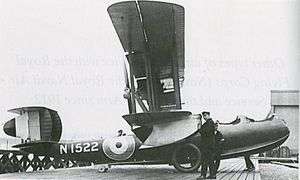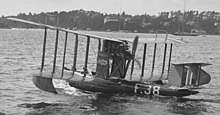AD Flying Boat
The AD Flying Boat was designed by the British Admiralty's Air Department to serve as a patrol aircraft that could operate in conjunction with Royal Navy warships. Intended for use during the First World War, production of the aircraft was terminated as the end of the war came into sight, and the type saw little operational use. A number were repurchased after the end of the war by Supermarine Aviation and rebuilt as civil transports, becoming known as the Supermarine Channel.
| AD Flying Boat | |
|---|---|
 | |
| An Air Department Flying Boat used by the Royal Naval Air Service (RNAS) | |
| Role | Flying boat |
| Manufacturer | Pemberton-Billing Ltd. |
| Designer | Linton Hope |
| First flight | 1916 |
| Primary user | Royal Navy |
| Number built | 27 |
Design and development
Designed in 1915 by Lieutenant Linton Hope,[1] the aircraft was of conventional biplane flying-boat configuration, and also featured a biplane tail with twin rudders. The pilot and observer sat in tandem in the nose, with the engine and pusher propeller mounted behind them, between the wings. The wings could be folded forwards to facilitate shipboard stowage.
Two prototypes were constructed in 1916 by Pemberton-Billing Ltd (later to become Supermarine Aviation).[1] The first prototype was intended to be powered by a 150 hp (112 kW) Sunbeam Nubian engine, but this was not ready with the Hispano-Suiza 8 being substituted.[2] Handling, both on the water and in the air was initially poor, demonstrating severe fore and aft vibration, known as porpoising during take-off, while subject to excessive Yaw during flight. These problems were eventually solved by revisions to the hull and the fin and rudder, allowing the AD Flying Boat to be ordered into production.[3][4] A total of twenty-seven production machines were built out of orders for eighty,[5] generally powered by 200 hp (149 kW) Hispano-Suiza engines, although examples were tested with Sunbeam Arab and Wolseley Python engines.[4]
Following the Armistice, Supermarine purchased nineteen of these aircraft back to modify them for the civil market as the Supermarine Channel, either as the Channel Mk I with 160 hp (119 kW) Beardmore 160 hp engines, or the Channel Mk II powered with 240 hp (179 kW) Armstrong Siddeley Puma engines. The reconfigured flying-boats provided accommodation for a pilot and three passengers in three open cockpits.
Operators

Military operators
- Chilean Air Force - One aircraft.
- Chilean Navy acquired one Channel with modified hull (similar to the Supermarine Seal) in 1922.[6]
- Imperial Japanese Navy purchased three Channels.[6]
- Royal Norwegian Navy Air Service purchased four Beardmore engined Channels in 1920, acquiring a further ex-civil aircraft. One remained in service until 1928.[7]
- Royal Swedish Navy purchased a single Channel in 1921, it being destroyed during testing.[6]
- Royal Navy
- Royal Naval Air Service operated AD Flying Boat.
Specifications (AD Flying Boat)
Data from British Aeroplanes 1914-18 [9]
General characteristics
- Crew: two, pilot and observer
- Length: 30 ft 7 in (9.32 m)
- Upper wingspan: 50 ft 4 in (15.34 m)
- Lower wingspan: 37 ft 7 1⁄4 in (11.462 m)
- Height: 13 ft 1 in (3.99 m)
- Wing area: 479 sq ft (44.5 m2)
- Empty weight: 2,508 lb (1,138 kg)
- Gross weight: 3,567 lb (1,618 kg)
- Powerplant: 1 × Hispano-Suiza 8 water-cooled V8 engine, 200 hp (150 kW)
Performance
- Maximum speed: 100 mph (160 km/h, 87 kn) at 2,000 ft (610 m)
- Endurance: 41⁄2 hr
- Service ceiling: 11,000 ft (3,400 m)
- Time to altitude: 30 min to 10,000 ft (3,050 m)
Armament
- Guns: 1 × .303 in (7.7 mm) Lewis gun on flexible mount for observer
- Bombs: small bomb load
References
| Wikimedia Commons has media related to AD Flying Boat. |
Notes
- Bruce 1957, p.3.
- Bruce 1957, p.4
- Andrews and Morgan 1987, p.23.
- London 2003, p.20-23.
- Andrews and Morgan 1987, p.355.
- Andrews and Morgan 1987, p.40.
- Andrews and Morgan 1987, pp.35-36.
- Nerdrum 1986, p.30.
- Bruce 1957, pp.5-7.
Bibliography
- Andrews, C. F., and E. B. Morgan. Supermarine Aircraft since 1914. London:Putnam, 1987. ISBN 0-85177-800-3.
- Bruce, J. M. British Aeroplanes 1914-18. London:Putnam, 1957.
- London, Peter. British Flying Boats. Stroud, UK:Sutton Publishing, 2003. ISBN 0-7509-2695-3.
- Nerdrum, Johan. Fugl fønix: En beretning om Det Norske Luftfartselskap. Oslo:Gyldendal Norsk Forlag, 1986. ISBN 82-05-16663-3. (in Norwegian)